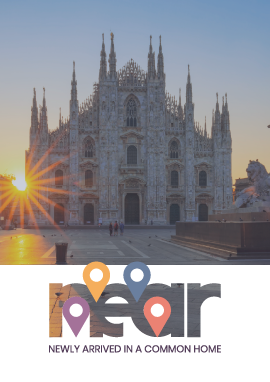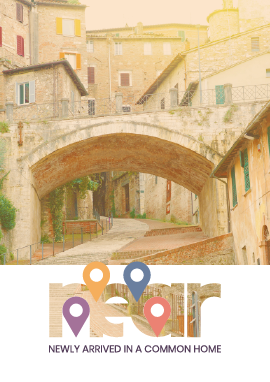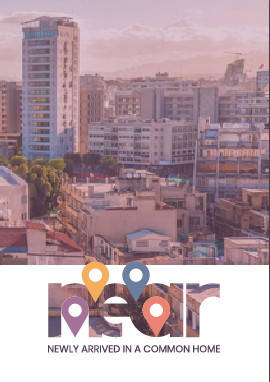The NEAR project aims to foster social orientation of migrants in the initial period of arrival and settlement in the local communities of destination. Diaspora stakeholders are some of the actors that the project empowers to act a Community Agents (C.A.) for newly arrived migrants. Part of the work done by NEAR is specifically aimed at providing these actors with the right knowledge and network to convey quick, context-specific and ready-to-use information and support through thematic trainings.
With this in mind, between March and December 2021 NEAR partners developed and implemented a number of activities directly addressed to diaspora members the four target cities, Milan and Perugia (Italy), Lisboa (Portugal) and Nicosia (Cyprus). The practice developed was eventually modelled into a number of tools under the NEAR National Stakeholder Reports, a set of publications taking stock of a year-long outreach, training and engagement of diaspora stakeholders. In doing so, they aim to facilitate the transfer of experiences, tools, knowledge and practices for organizations, practitioners and other interested groups to build the capacity of and empower diaspora communities as actors in the integration of newly arrived migrants at local level.
The reports follow the steps undertaken in the project, offering practical suggestions, templates and checklists along on how to:
- take into account diaspora communities in selecting target areas
- reach out to and engage diaspora communities preliminarily
- identify needs and select the right stakeholders for projects and initiatives
- organise content for training programmes
- use the most appropriate training methods and tools
- engage with community agents in a sustained way
- co-create communication campaigns and tools with community agents to best target newly arrived migrants
The report on Nicosia highlights the distinctive traits and lessons learnt that characterised the NEAR implementation in Cyprus by CARDET and that could be transferred in new integration contexts.
To identify the right stakeholders and area, CARDET tapped into its existing collaborations with formal and informal organizations that involved migrants, such as Philippine associations and the Migrants information centre. These collaborations helped CARDET find the right C.A. that wanted to expand their knowledge and help newly arrived migrants. These C.A. were both working with organizations and individuals, since the years living and working in Cyprus allowed them to create their own network and community to help others. This step was key to identifying and building a network of stakeholders in the area that were actively supporting those coming to a new city. Considering that migrants in Cyprus are coming into the country mainly from Asia and the Middle East (Philippines, Nepal, India, Syria, Pakistan), CARDET contacted associations and individuals it knew and collaborated with so that they could participate and get further training on how to build their skills. The majority of the professionals were domestic workers and mediators/translators.
In selecting key diaspora stakeholders to involve directly, CARDET targeted people who had been already in the country for more than 3 years and had already a distinguished role in the area and in the migrant community so that the newly arrived migrant could feel more comfortable talking to “people like them” who had to go through similar procedures or even faced the same problems. Once CARDET identified people with key roles in their communities, it provided informal opportunities to get to know them. A round table of discussion was implemented with the 10 C.A. to discuss the needs and the problems migrants faced and what problems their fellow nationals expressed. The round table was delivered via Zoom due to COVID-19 protocols.
The round table talk was key to identifying the most pressing knowledge gaps and needs and structure the training content and tools accordingly. Thus, the training was designed considering the thematic that had came up from the round table and the issues discussed. Priority was given to topics that seemed to be the most pressing at that moment in time, including but not being limited to: soft skills, right and welfare of the migrants, security (health, self, protection against violence) and orientation in the employers-employee relationship.
Multiple experts and service providers were involved in the final training for the C.A., with the purpose of teaching them how to be mentors to themselves and others. In particular, the training involved a social worker, a life coach and a communication officer, as they could help C.A. in their better adjustment in the host country. The training program consisted of three modules. Module 1 was about legislation and also outlined the important elements of the Cyprus culture, customs, and traditions. Module 2 discussed services, outlining the education system of Cyprus by giving emphasis on the rights of third country nationals. Module 3 was about communication and focused on finding out what is the role of each leader and at the same time find out what is not their role in the community. Part of the training was to create a “community map”, a map that aimed at creating an interactive “place” to show and tell the experiences and share the secrets of the neighborhood. By building the map of the neighborhood, CARDET wanted communities to actively participate in telling the cultural, social, and creative story of the area. It is worth noting that, during the training, a trainee-centered approach was followed. In other words, while trainers are still expert figures, trainers and trainees played an equally active role in the learning process. The trainers’ primary role was to coach and facilitate the trainees’ learning and overall comprehension of material, and to measure learning through both formal and informal forms of assessment, like group projects, portfolios and participation.
The community agents remained engaged throughout the whole training and said they felt grateful for having had the opportunity to contribute in co-creation of the programme. Also, the C.A. appreciated being able to be heard and express their real needs. More specifically, one of the gatherings was completely dedicated to the C.A., who were asked elaborate on their personal stories, emotions and go as far as sharing what they liked or did not like about life in Cyprus. Overall, the C.A. were very excited to participate and helped CARDET build a map for the newly arrived migrants and “travel” with them as they settle in Cyprus with the hope they feel safer and happier in the new country.









